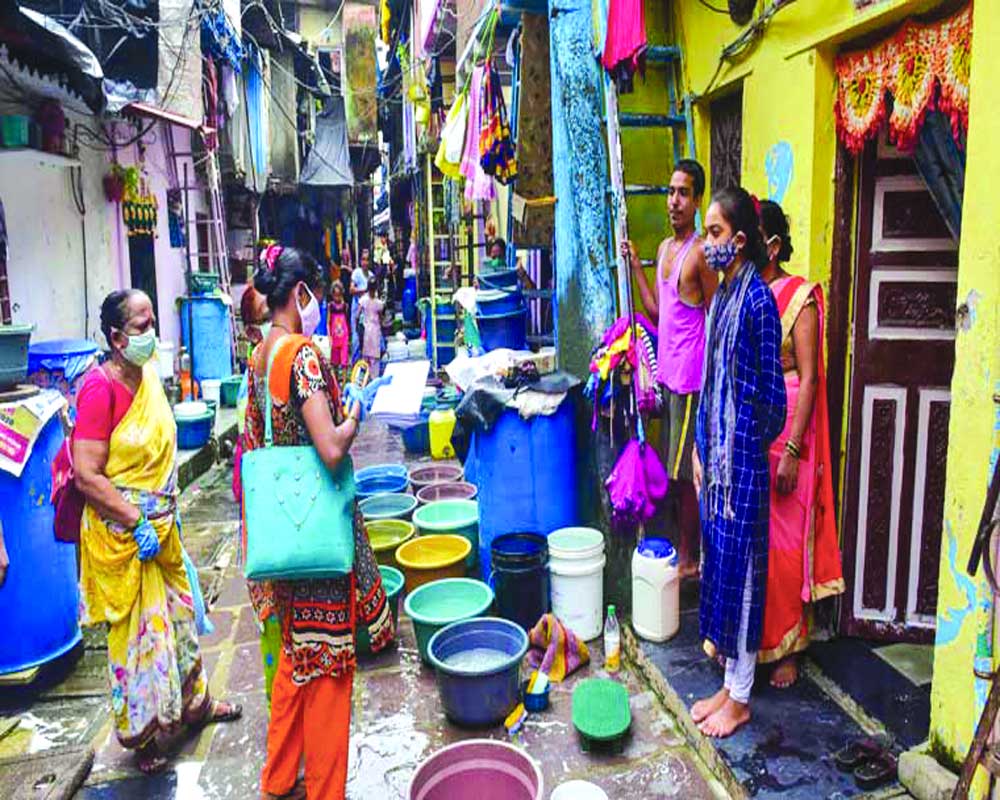The community health volunteers have led the war against COVID-19 from the front in Dharavi and various urban slums. By Alka Gadgil
Earlier this year, in April, as Asia’s largest slum reported its first Corona positive case, everyone had predicted that it might soon become one of the largest containment zones as it was already an overpopulated area. By July, contrary to all the predictions and surprisingly so, reports confirmed that Dharavi was able to effectively control the spread. The efforts of each one involved in the massive decline in the number of cases must be recognised and appreciated. One such group is that of the Community Health Volunteers (CHV) who have led the war against COVID-19 from the front — not just in Dharavi but in several other urban slums of the city. Before turning into Corona warriors, they were responsible for reaching out to thousands of citizens on a daily basis to safeguard their health.
Savita Kate, Vidya Sawant, Mitali Desai, Sukanya More, Asha Fule, Sarita Ghade, Bela Parab and other extraordinary women form the CHV group that has been working in these slums for years. Presently, these frontline workers have been entrusted with COVID-19 responsibilities like identification of symptomatic persons from their zone, encouraging them to go for test and if the test result is positive, reporting it. They also provide assistance in admitting the positive persons to a hospital.
Of the 227 administrative wards of Mumbai, the Brihanmumbai Municipal Corporation (BMC) runs health posts in 183 wards. These wards are largely situated within impoverished neighbourhoods and are designed to provide primary and preventive healthcare to millions of urban poor. CHVs form the backbone of these health posts — they are the ones who go into the community, tirelessly engaging with families on a daily basis.
Be it couples in need of family planning advice or pregnant women who require constant care and support or little ones whose future well-being depends on timely immunisation, these women work seamlessly not just with the people they serve but also doctors — the Public Health Nurse (PHN) and the Auxiliary Nurse Midwife (ANM) at the health posts.
Since 1990, the BMC has been hiring CHVs who generally hail from the areas they serve. One CHV caters to 1,200 households, covering 60 households daily. The fact that they are temporary staff without any employee benefits hasn’t ever deterred them from performing their duties. However, the way they are contributing to contain the pandemic in most vulnerable areas certainly makes them worthy of every such benefit.
Ranked the lowest in overall human development indices by a 2015 Tata Institute of Social Sciences’ (TISS) report, residents of Chembur-Govandi in M ward of BMC live in squalor, next to the city’s largest dumping ground. The ward was also declared as a hotspot of COVID in early May this year. However, due to the dedicated efforts of all the Corona warriors like doctor, sanitary inspector, administrative officer and CHV, M ward is witnessing a rapid drop in cases after an aggressive contact tracing was carried out.
Savita lists the tasks assigned to them, “The BMC has trained us to conduct immunisation drives, provide counselling on family planning methods, tackle diseases like tuberculosis (TB), rubella, diabetes and cancer, and also look after the expectant women in our neighbourhoods. It’s not an easy job but we do it for our people and now we have to tackle Coronavirus in the high-risk wards of Mumbai.”
“Being responsible for ensuring proper completion of the immunisation schedule for each child and pregnant woman in our area, we cannot stop the immunisation drives and have to carry on with it in these difficult times. If health of people living in these slums is compromised, then they will most likely get infected with the Coronavirus. Immunisation will give them the capacity to fight the diseases,” shared Vidya Sawant, another active CHV.
Counselling couples on family planning is another difficult mission entrusted to the CHVs and in this period of the pandemic, it has become problematic to speak about birth control methods. The women unanimously declare that it is a sensitive matter and no amount of familiarity makes it an easy subject of discussion. Corona has already impoverished the slum dwellers — pregnancies and childbirth in these hard times will only add up to their woes.
Apart from immunisation and contraception, they have to assist in ensuring institutional deliveries of not just normal pregnancies but also the high-risk cases. Obviously, this task holds even more importance during this pandemic.
CHVs Sarita and Bela believe that it is due to the rapport that they share with the families, BMC’s Public Health Department decided to seek their help in identifying symptomatic persons from the slum areas. “Our colleagues from Dharavi were on the fore front in containing the outbreak. Community spread in Dharavi would have been disastrous to Mumbai. BMC got into action and a team of doctors, sanitary inspector and two CHVs mopped up the areas within Dharavi and put a stop to any possible community spread,” they added.
The burden of the majority of the on-ground tasks pertaining COVID-19 falls squarely on the CHVs. For all their efforts these women make a meagre Rs 5,000 per month. However, since the outbreak of Corona, they are being paid an allowance of Rs 300 per day. For risking their lives and helping the most marginalised communities dedicatedly, they expect a fair compensation. Despite the struggles, this band of CHVs continues to be driven by a sense of community, compassion and camaraderie and the pandemic has proved it once again. The slums of Mumbai were able to contain the virus, thanks to the efforts put in by the CHVs and the rest of the health functionaries.
— (Charkha Features)


























